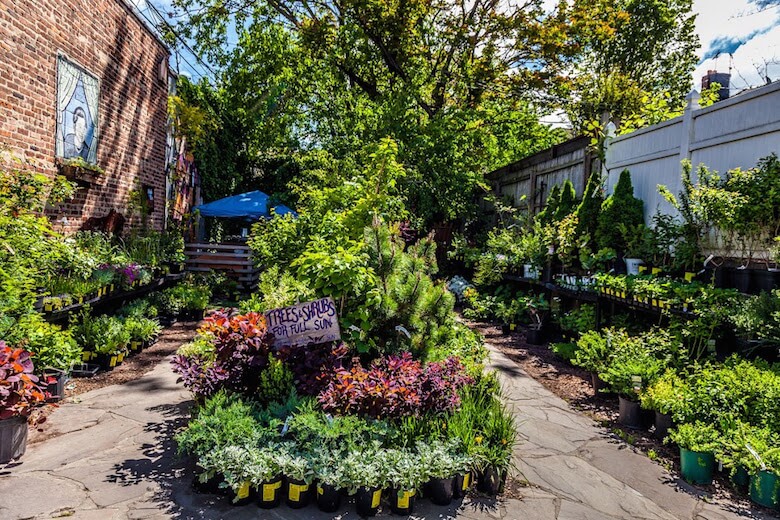
“My father understood the importance of food as a tool,” Joe Franquinha says of his dad, Manny, leaning across the desk in his office at Crest Hardware. The wall behind him is covered with handwritten thank-you cards from customers, newspaper clippings charting the store’s evolution over the past 55 years, and framed photos of the father and son duo glinting in the warm afternoon sunlight.
Manuel “Manny” Franquinha’s rich life—beginning in Park Slope circa 1928, where he was born to immigrant Portuguese parents—and recent death are equally palpable in the quiet office. “I put this shirt on for the first time in a month and a half, and it feels good,” Franquinha, 34, says, looking down at the Crest logo embroidered onto his maroon button-front. “There aren’t two hands on this torch anymore, and it’s a damn heavy torch. He did so much.”
Fresh grief dampens his face but laughter readily follows as memories of Manny’s simple, sometimes quirky habits rise to the surface of our conversation: his love of Portuguese peasant soup and sardines on toast; the shameless sweet tooth he once broke on a frozen chocolate bar; the firm belief in reinvesting what he earned back into his community by eating and shopping locally.
“One thing he always believed in was feeding his employees,” Franquinha recalls. “If they had a tough week and their money had to go elsewhere, there was always something here for them—a loaf of bread, cereal, milk, coffee. And if he was running errands that day, there could be a dozen doughnuts from Peter Pan or a specialty loaf from Napoli Bakery.” Inasmuch as the store is the local source for home improvement and gardening essentials, Franquinha laughs that his father’s office was the go-to spot for frozen potpies and fresh bananas—staples of the food stash Manny would offer anyone who came to visit.
What is now a full-service hardware store and garden center—with not one but two mascots, Franklin the pot-bellied pig and Finlay the chatty African gray parrot—first began as a humble hardware store in front of an empty lot overrun by weeds, save for a small, machete-hacked path. “When you got down that path, there was this magical little secret vegetable garden,” says Franquinha. The gardener? Their neighbor, Mateo, a “fresh off the boat” Italian man who reminds Franquinha of his own Italian grandfather; he religiously gardened and taught him at a young age how to make “gravy,” also known as Italian red sauce. “I remember driving with him out to the Brooklyn Terminal Market in his champagne Pontiac Bonneville, and we’d get crates and crates of tomatoes,” he recalls. Watching Mateo tend the garden, hauling in water and manure by hand, “was like having this spiritual extension of my grandfather who had passed away years back.”

When Franquinha decided to build what is now the massive garden center behind the hardware store, the vendors at Terminal Market were the first to help him get on his feet. Mateo’s raw and unpolished garden was in the way of the expansion but rather than push him off the lot they had shared for so many years, Franquinha carved out space in the new garden center where unlimited water, soil and supplies are within an arm’s reach. Rent is paid in the form of fresh cucumbers, squash, jars of Mateo’s sauce that “is phenomenal, as a tomato sauce that literally goes from earth to Mason jar should be” and bottles of homemade wine. “It’s beyond table wine,” Franquinha gushes. “It has that dance and bite on your tongue like it’s slightly carbonated and you feel it after you swallow—it’s alive.”
The soil of the garden has grown richer over the years though its size has gotten smaller, commensurate with Mateo’s age and ability to tend it, but for now you can still see juicy tomatoes, forest green cucumbers, and luscious purple figs peeking out from behind tall racks of succulents and a sea of outdoor plants springing out of their temporary plastic pots. Franklin the pig naps in his pen, underneath a mural of Franquinha’s grandmother, Francesca, to whom he attributes his love of delicate flavors hidden in simple ingredients. “I can’t see squash blossoms on a menu without thinking of hers,” he reminisces. “Oh my God, it takes you some place. It’s like three ingredients: breadcrumbs, olive oil, squash blossoms. That’s it. That’s all you need and it can still be a mindblowing experience for your palate.”
At the helm of a growing business, Franquinha maintains the easy going, civic-mindedness of his father by eating locally and slowly. “There’s a lot to be said for taking time in a meal,” he explains, noting that the Italian food culture he grew up with was less about gluttony and “more about the flavors, the range of taste within a simple dish.” Thanks to the influence of his vegetarian wife and their pet pig, more of those meals are centered around plants. “Eating less meat was a huge turning point for me and my consumption, and I’m a better person for it.” says Franquinha. Much like his efforts to keep Mateo’s garden alive, the payoff to eating well has been worth the adjustment to his lifestyle.
Despite the changing neighborhood, Franquinha contends that his East Williamsburg community is more tightly-knit than folks on the outside give it credit for. To prove his point, he recounts a recent review of the store. “It was like, ‘I love this store. I came in for a light bulb and was offered homemade cookies made by a neighbor at the front counter,’” Franquinha recalls excitedly. “And that’s it! That whole cup of sugar thing. Sugar is just the verbial vessel we swap out for cucumbers, eggplant, figs”—and cookies, it appears.
Food is the glue one doesn’t expect to find in a hardware store, but at Crest, it’s always within reach and quietly woven into the simple, daily practice of being a good neighbor.



